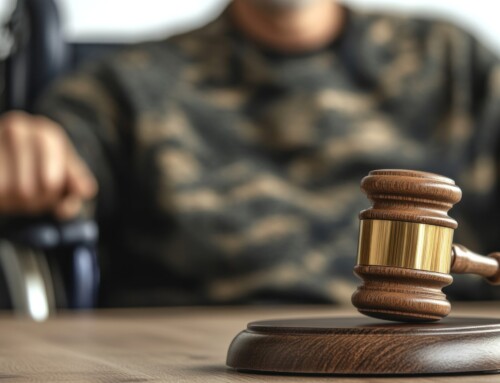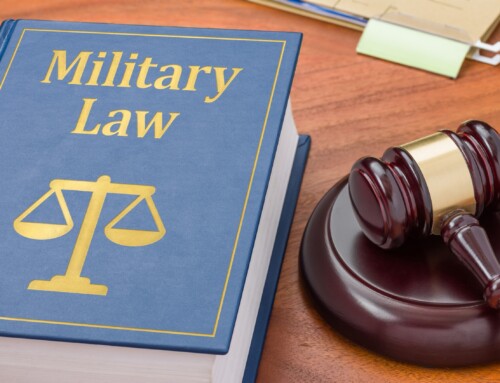Service members are held to a higher standard of conduct both on and off duty, and any violation of military law can have serious repercussions. DUI and drug offenses in the military are not only criminal matters but also breaches of the Uniform Code of Military Justice (UCMJ), which can lead to severe disciplinary actions, including court-martial, reduction in rank, loss of benefits, and even discharge from service.
If you are facing charges for driving under the influence (DUI) or drug-related offenses, understanding the legal consequences and available defenses is critical. Military justice operates differently from civilian courts, with harsher penalties and unique legal procedures. However, being charged does not automatically mean conviction—there are strategic legal defenses that can challenge the evidence against you, mitigate penalties, or even lead to case dismissal.
In this article, we’ll break down the potential consequences of DUI and drug offenses in the military and explore legal defense strategies that may help safeguard your career and future.
Key Takeaways
- Military DUI and drug offenses are governed by the UCMJ, leading to strict consequences including court-martial and potential dishonorable discharge.
- The military enforces a zero-tolerance policy on substance abuse, resulting in significant administrative and judicial penalties for violations.
- Service members have legal defenses available against DUI and drug charges, including challenging the validity of arrests and testing procedures.
At The Law Office of Purav Bhatt, we understand the unique legal challenges that service members face under the Uniform Code of Military Justice (UCMJ). Our dedicated military defense attorneys have extensive experience handling a wide range of military criminal cases, including court-martial proceedings, non-judicial punishment (Article 15), administrative separations, and appeals.
Whether you are under investigation or facing charges for offenses such as desertion, sexual assault, DUI and drug-related charges, or conduct unbecoming of an officer, our legal team is prepared to aggressively defend your rights.
Time is critical in military defense cases. The sooner you seek legal representation, the better your chances of building a strong defense. Contact us today at 773-912-0268 or reach out online for a case evaluation. Let us help you navigate the military justice system and work toward the best possible resolution for your case.
👉Also Read: Bridging Civilian and Military Justice: How a Military Defense Attorney Can Protect Your Future
Understanding Military DUI and Drug Offenses
DUI in the military involves operating a vehicle with a blood alcohol concentration (BAC) over 0.08% or while impaired by drugs, violating Article 111 of the Uniform Code of Military Justice (UCMJ). The UCMJ governs DUI offenses for military personnel, regardless of where the offense occurs, ensuring that military law applies both on and off base. This means that service members face both civilian and military legal actions, emphasizing the rigorous standards expected of them.
Military DUI offenses often lead to more severe consequences than those under civilian DUI laws. For instance, while a civilian might face fines and license suspension, a service member could face disciplinary actions and court-martial under the UCMJ. This underscores the military’s commitment to maintaining order and discipline among its ranks. If a DUI arrest occurs off base, the service member faces prosecution in civilian court along with potential military administrative penalties, showcasing the dual layers of accountability.
A DUI arrest usually starts with detention by military police or local law enforcement. Service members must operate vehicles responsibly and safely; failure to do so can lead to serious repercussions, including charges of drunken or reckless operation and military service-related consequences.
Drug-related offenses are equally serious violations, covered under the same rigorous standards of the UCMJ. The military’s stringent approach to these offenses reflects its broader commitment to discipline and readiness.
Military’s Zero-Tolerance Policy on Substance Abuse
The military maintains an unwavering zero-tolerance policy on substance abuse across all branches. This policy prohibits the possession, use, and sale of illegal drugs, treating impaired driving as a serious offense. DUIs are strictly prohibited and preventable, reinforcing the need for responsible behavior among service members.
This zero-tolerance policy underscores the severe consequences of DUI or drug offenses for service members. The military’s strict stance on substance abuse is designed to maintain a high level of discipline and readiness within its ranks. Violations can lead to significant administrative and judicial penalties, impacting both the personal and professional lives of those involved.
The military’s commitment to preventing substance abuse extends beyond punishment; it aims to foster a safe and disciplined environment. This policy is enforced rigorously on every military installation, ensuring that the armed forces remain focused and effective in their duties.
Common Circumstances Leading to DUI and Drug Offenses in the Military
Service members across all branches of the military are held to strict legal and ethical standards, both on and off duty. Despite these expectations, DUI and drug-related offenses remain a persistent issue at major military installations such as Naval Station Norfolk, Fort Bliss, and Joint Base Lewis-McChord. Several common circumstances contribute to these offenses, often leading to severe legal and career consequences under the Uniform Code of Military Justice (UCMJ).
1. Off-Base Social Drinking and DUI Arrests
Many military personnel choose to unwind at local bars, nightclubs, or private gatherings near their duty stations. However, misjudging alcohol tolerance, failing to arrange designated transportation, or encountering DUI checkpoints can result in a DUI arrest. Even if the incident occurs off base, service members remain subject to military discipline, and consequences can include:
- Non-judicial punishment (NJP) or court-martial proceedings.
- Loss of rank, pay reduction, or restricted duty assignments.
- Administrative separation or discharge, affecting future employment.
2. Prescription Drug Misuse After Injury
Injury-related pain management is another common factor leading to drug offenses in the military. Service members prescribed opioids, muscle relaxants, or sedatives for legitimate injuries may continue using the medication after their prescription expires. Since the military conducts routine and random drug testing, unauthorized prescription drug use can lead to:
- Charges under Article 112a of the UCMJ for wrongful use of controlled substances.
- Medical discharge or mandatory enrollment in a substance abuse program.
- Other-than-honorable discharge, impacting access to VA benefits.
3. Recreational Drug Use in States with Legalized Marijuana
While states such as Washington, California, and Colorado have legalized marijuana for recreational use, military policies strictly prohibit its use by active-duty personnel. Many service members mistakenly assume that off-duty, off-base marijuana consumption is permissible. However, due to routine urinalysis screenings, positive THC test results often lead to:
- Mandatory disciplinary action, including rank demotion or pay forfeiture.
- Security clearance revocation, limiting career opportunities.
- Administrative separation, ending military service prematurely.
4. Stress and Substance Abuse in High-Pressure Environments
The demands of military life—long deployments, combat exposure, and high-stakes responsibilities—can lead some service members to self-medicate with alcohol or drugs. Stress-related substance abuse may start as occasional use but can escalate into dependency, leading to:
- Failed drug tests, triggering a chain of disciplinary actions.
- Referral to substance abuse treatment programs, sometimes at the cost of continued service.
- Loss of military benefits and potential criminal charges.
Additionally, post-traumatic stress disorder (PTSD), which affects 11 to 30% of service members returning from Iraq or Afghanistan, contributes to increased alcohol-related incidents. These scenarios highlight the complex interplay of social, psychological, and environmental factors in DUI and drug offenses.
Consequences of DUI and Drug Offenses in the Military
The consequences of DUI and drug offenses in the military are severe and far-reaching. A DUI offense can lead to various administrative penalties, including the revocation of driving privileges and a General Officer Memorandum of Reprimand. Service members may also face mandatory substance abuse treatment following a DUI charge. These penalties highlight the military’s commitment to maintaining discipline and safety.
More severe consequences include the possibility of a dishonorable discharge, which can have a lasting impact on a service member’s career and benefits. Penalties are particularly steep for those with prior DUI offenses, significantly increasing the risk of dishonorable discharge. The comprehensive consequences of DUI or drug offenses extend beyond military careers, affecting personal lives and future opportunities.
Commanding officers can impose administrative penalties like corrective training or revocation of privileges for DUI offenses. Military DUI charges can lead to a court-martial, resulting in significant penalties, including imprisonment and loss of benefits. Active-duty service members charged with a DUI on a military installation face serious consequences. This includes an Article 15 hearing or a court-martial, along with adverse administrative penalties. These severe consequences reflect the military’s stringent approach to maintaining order and discipline.
👉Also Read: Facing Legal Trouble? Turn to Chicago’s Top Criminal Defense Attorney For a Strong Defense
Impact on Military Careers and Personal Lives
A DUI conviction can severely disrupt a service member’s military career, potentially ending it and impacting promotions. DUI offenses can hinder deployment eligibility and affect a service member’s ability to receive desirable positions. Convictions can also result in reduced security clearance status, disqualifying service members from promotions and critical assignments.
A DUI conviction can result in loss of rank or pay, negatively impacting military standing. A DUI conviction can also lead to security clearance revocation, critically affecting future assignments. The creation of a lasting criminal record can further hinder civilian job prospects post-service.
Participation in rehabilitation programs can help mitigate the impacts of substance abuse on military careers and personal lives. The far-reaching consequences of a DUI charge affect not only military careers but also personal well-being and future life opportunities. These impacts highlight the importance of understanding and avoiding behaviors that can lead to DUI and drug offenses.
Administrative Separation and Other Disciplinary Actions
Administrative actions for DUI offenses may involve several consequences. These can include revocation of pass, reprimand, revocation of driving privileges, corrective training, bar to reenlistment, and reduction of grade. These penalties aim to correct behavior and maintain discipline within the ranks.
For minor DUI offenses, military members may be subject to non-judicial punishment under Article 15, with the right to demand a trial by court-martial instead. These administrative actions and disciplinary measures ensure that service members adhere to the high standards expected in the military.
Legal Defenses Against DUI Charges in the Military
Various legal defenses are available to service members facing DUI charges. One strategy involves challenging the validity of the arrest if it was made without valid probable cause, rendering any evidence gathered inadmissible in court. Additionally, defense attorneys may argue that the sobriety tests administered were inaccurate.
Another common defense strategy involves questioning the equipment and procedures used to determine blood alcohol concentration. The timing and conduct of sobriety tests can be critical in establishing a defense, as field sobriety tests can be invalidated if the defendant’s performance is affected by medical conditions.
A defense may demonstrate that a lack of observable intoxication does not equate to legal intoxication. These strategies highlight the importance of a robust defense tailored to the specifics of each case, ensuring that service members receive fair treatment under military justice.
Defending Against Drug-Related Charges
Defending against drug-related charges in the military involves several key strategies. One approach involves challenging the chain of custody for drug tests, raising doubts about the evidence’s integrity. The defense might argue against the validity of blood test results by highlighting mishandling in the chain of custody.
Demonstrating a lack of probable cause for searches can significantly impact the outcome of drug-related charges. Additionally, defendants can invoke alternative defenses, such as involuntary intoxication, if they were unknowingly administered an intoxicating substance.
These defense strategies are crucial in maintaining a service member’s career and reputation within the military.
Role of Military Court Martial Defense Lawyers
Military defense lawyers play a vital role in navigating the complexities of military legal proceedings and protecting service members’ rights. These lawyers must understand the unique aspects of the Uniform Code of Military Justice (UCMJ) to effectively represent their clients. Service members are entitled to legal representation and can request specific military lawyers when faced with charges.
Effective military defense strategies often depend on the attorney’s familiarity with both military and civilian legal standards. Understanding procedural elements is critical for robust military court-martial defense preparation.
Character witnesses vouching for a service member’s integrity can strengthen their defense against drug charges. Consulting a military defense attorney before responding to disciplinary actions ensures service members’ rights are defended. Legal representation is crucial for service members accused of drunk driving or drug-related offenses.
Protecting Your Rights During Legal Proceedings
Protecting your rights during legal proceedings starts with securing legal representation before making any statements to military investigators. Documenting experiences during interrogations significantly aids defense attorneys in building a strong case.
Understanding the tactics used by investigators, such as deception, is crucial for service members to prevent self-incrimination. Knowing your rights during legal proceedings empowers service members to navigate challenges if charged with DUI or drug offenses.
👉Also Read: Chicago Military Defense Guide: Exploring Types of Court-Martial & Their Differences
Protect Your Future with Experienced Military Defense Attorneys
Service members should actively avoid alcohol and drug use, especially before operating vehicles, to prevent serious legal repercussions. Self-reporting substance use issues can offer protection under the Limited Use Policy, reducing potential administrative actions’ severity.
Understanding the severe consequences of DUI and drug offenses is crucial for maintaining a successful military career and personal well-being. By making informed choices and seeking help when needed, service members can avoid the pitfalls associated with substance abuse and uphold the honor and discipline expected in the military.
At The Law Office of Purav Bhatt, P.C., we understand the unique challenges presented under the Uniform Code of Military Justice (UCMJ) and the critical importance of a robust legal defense.
Our team, led by esteemed attorneys Purav Bhatt and Anthony Villalobos, is dedicated to defending service members with the diligence and precision these cases demand. With over a decade of experience in state and federal criminal defense and specialized expertise in military law, we are uniquely equipped to navigate the complexities of military legal proceedings and command structures.
If you or a loved one is under investigation or facing charges related to DUI or drug offenses in the military, don’t wait. Call our office or contact us online to schedule a confidential consultation. Let The Law Office of Purav Bhatt, P.C. stand by your side, protect your rights, and build a strong defense for your future.








